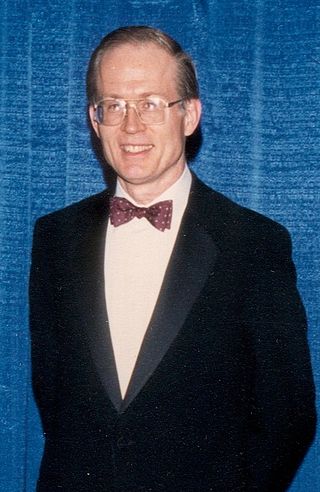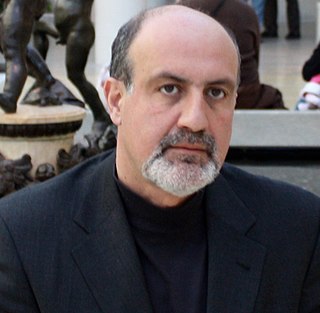Long-Term Capital Management L.P. (LTCM) was a highly leveraged hedge fund. In 1998, it received a $3.6 billion bailout from a group of 14 banks, in a deal brokered and put together by the Federal Reserve Bank of New York.
Financial economics is the branch of economics characterized by a "concentration on monetary activities", in which "money of one type or another is likely to appear on both sides of a trade". Its concern is thus the interrelation of financial variables, such as share prices, interest rates and exchange rates, as opposed to those concerning the real economy. It has two main areas of focus: asset pricing and corporate finance; the first being the perspective of providers of capital, i.e. investors, and the second of users of capital. It thus provides the theoretical underpinning for much of finance.

Robert Cox Merton is an American economist, Nobel Memorial Prize in Economic Sciences laureate, and professor at the MIT Sloan School of Management, known for his pioneering contributions to continuous-time finance, especially the first continuous-time option pricing model, the Black–Scholes–Merton model. In 1997 Merton together with Myron Scholes were awarded the Bank of Sweden Prize in Economic Sciences in Memory of Alfred Nobel for the method to determine the value of derivatives.
The Black–Scholes or Black–Scholes–Merton model is a mathematical model for the dynamics of a financial market containing derivative investment instruments. From the parabolic partial differential equation in the model, known as the Black–Scholes equation, one can deduce the Black–Scholes formula, which gives a theoretical estimate of the price of European-style options and shows that the option has a unique price given the risk of the security and its expected return. The equation and model are named after economists Fischer Black and Myron Scholes. Robert C. Merton, who first wrote an academic paper on the subject, is sometimes also credited.

Fischer Sheffey Black was an American economist, best known as one of the authors of the Black–Scholes equation.

Myron Samuel Scholes is a Canadian–American financial economist. Scholes is the Frank E. Buck Professor of Finance, Emeritus, at the Stanford Graduate School of Business, Nobel Laureate in Economic Sciences, and co-originator of the Black–Scholes options pricing model. Scholes is currently the chairman of the Board of Economic Advisers of Stamos Capital Partners. Previously he served as the chairman of Platinum Grove Asset Management and on the Dimensional Fund Advisors board of directors, American Century Mutual Fund board of directors and the Cutwater Advisory Board. He was a principal and limited partner at Long-Term Capital Management (LTCM), a highly leveraged hedge fund that collapsed in 1998, and a managing director at Salomon Brothers. Other positions Scholes held include the Edward Eagle Brown Professor of Finance at the University of Chicago, senior research fellow at the Hoover Institution, director of the Center for Research in Security Prices, and professor of finance at MIT's Sloan School of Management. Scholes earned his PhD at the University of Chicago.

Nassim Nicholas Taleb is a Lebanese-American essayist, mathematical statistician, former option trader, risk analyst, and aphorist. His work concerns problems of randomness, probability, complexity, and uncertainty.
Oldřich Alfons Vašíček is a Czech mathematician and quantitative analyst, best known for his pioneering work on interest rate modelling; see Vasicek model.
The American Finance Association (AFA) is an academic organization whose focus is the study and promotion of knowledge of financial economics. It was formed in 1939. Its main publication, the Journal of Finance, was first published in 1946.
The following outline is provided as an overview of and topical guide to finance:

Bendheim Center for Finance (BCF) is an interdisciplinary center at Princeton University. It was established in 1997 at the initiative of Ben Bernanke and is dedicated to research and education in the area of money and finance, in lieu of there not being a full professional business school at Princeton.
A master's degree in quantitative finance is a postgraduate degree focused on the application of mathematical methods to the solution of problems in financial economics. There are several like-titled degrees which may further focus on financial engineering, computational finance, mathematical finance, and/or financial risk management.
Jonathan Edwards "Jon" Ingersoll, Jr. is an American economist. He is the Adrian C. Israel Professor of International Trade and Finance at Yale School of Management. Prior to coming to Yale he was on the faculty at the Graduate School of Business at the University of Chicago.
In finance, an option is a contract which conveys to its owner, the holder, the right, but not the obligation, to buy or sell a specific quantity of an underlying asset or instrument at a specified strike price on or before a specified date, depending on the style of the option.
Fischer Black Prize is a memorial prize awarded in honor of Fischer Black that rewards individual financial research. The prize was established in 2002 and first awarded in 2003. It is awarded to a financial scientist for a body of work that demonstrates significant original research that is relevant to finance practice. Eligible scholars must either be below 40 years in age, or under age 45 but not have been awarded a Ph.D. by age 35. The prize is awarded biennially at the American Finance Association's Annual Meeting. This award to honor a leading young finance scholar is analogous to the John Bates Clark Medal in economics and the Fields Medal in mathematics.
Jack Lawrence Treynor was an American economist who served as the President of Treynor Capital Management in Palos Verdes Estates, California. He was a Senior Editor and Advisory Board member of the Journal of Investment Management, and was a Senior Fellow of the Institute for Quantitative Research in Finance. He served for many years as the editor of the CFA Institute's Financial Analysts Journal.
Quantitative analysis is the use of mathematical and statistical methods in finance and investment management. Those working in the field are quantitative analysts (quants). Quants tend to specialize in specific areas which may include derivative structuring or pricing, risk management, investment management and other related finance occupations. The occupation is similar to those in industrial mathematics in other industries. The process usually consists of searching vast databases for patterns, such as correlations among liquid assets or price-movement patterns.
Mathematical finance, also known as quantitative finance and financial mathematics, is a field of applied mathematics, concerned with mathematical modeling in the financial field.
In finance, a contingent claim is a derivative whose future payoff depends on the value of another “underlying” asset, or more generally, that is dependent on the realization of some uncertain future event. These are so named, since there is only a payoff under certain contingencies. Any derivative instrument that is not a contingent claim is called a forward commitment.




